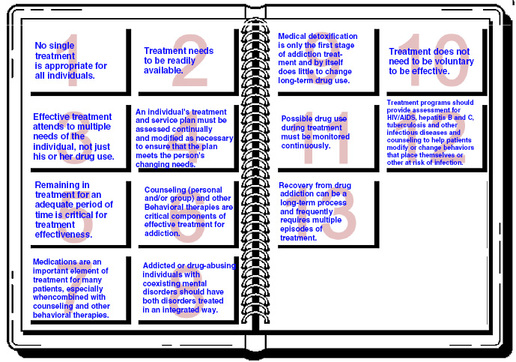The WAGER Vol. 5(17) – NIDA’s 13 Principles
The National Institute on Drug Abuse (NIDA) reports that it supports over 85% of the world’s research on the health aspects of drug abuse and addiction. As part of the National Institutes of Health, NIDA provides funds to some of the best-known addiction researchers. In October 1999, NIDA released Principles of drug addiction treatment: A research-based guide. Covering multiple therapies, the document presents 13 principles of effective treatment. Although NIDA’s mission limits its organizational scope to substance abuse, several of the principles also are relevant and applicable to the treatment of pathological gambling. The graphic below presents a complete list of all 13 principles:
The relevance of several principles to gambling treatment is clear; that treatment needs to be readily available (principle 2) is as applicable to cocaine as it is to gambling. The cross-addiction relevance of other principles is less obvious. For example, principle 12 suggests that persons in treatment be tested for infectious diseases. It is true that certain modes of drug intake can transmit disease. Since the risk of disease transmission during participation in gambling activities is limited compared to intravenous drug use, this principle may not apply to gamblers. Nevertheless, clinicians should evaluate patients on a case-by-case basis to determine the appropriateness of testing.
Although the treatment needs of pathological gamblers and persons with substance abuse disorders may differ, the NIDA principles provide a good point of departure from which addiction-specific treatments can be developed.
References
National Institute on Drug Abuse (1999). Principles of drug addiction treatment: A research-based guide.(NIH Publication No. 99-4180). Bethesda, MD: National Institutes of Health.
